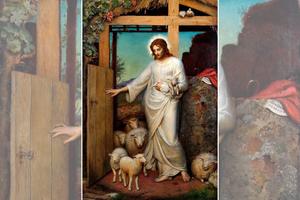24th Sunday in Ordinary Time – The Good Shepherd and the Lost Sheep
SCRIPTURES & ART: The Good Shepherd and the Lost Sheep are long constants in the tradition of Christian sacred art, going back even to the catacombs.

The key theme of this Sunday’s Gospel is the recovery of the repentant sinner. The Gospel itself comes in two versions: a short and a long form. The short form includes only the first two parables in Luke 15, about the Lost Sheep and the Lost Drachma. The long form encompasses the entire chapter, adding the Parable of the Prodigal Son.
This essay focuses on the short form. If you want to explore the Parable of the Prodigal Son, see here.
The two “lost” items featured in Luke 15:1-10 focus on what was in ancient Israel would have typically been a man’s world and a woman’s world. The woman is a housewife, searching her house for misplaced household funds. The man is the shepherd, a nomad following his flocks in quest for pasturage. Contrary to modern mythology, shepherds in Jesus’ day did not always enjoy a positive reputation. Because ancient Israel valued a continuity of familial/clan identity, the wandering shepherd sometimes elicited the same prejudices of dishonest unrootedness that Roma (Gypsies) did in Europe.
The shepherd is attached to his sheep. They are “his” sheep, which is what distinguishes him from the hired hand. The sheep know his voice. They follow him.
Or maybe not.
“What man among you having 100 sheep and losing one of them would not leave 99 in the desert and go after the lost one until he finds it?”
I must confess that I am not sure Jesus’s question would garner the same response today it would have in his times.
Ours is a utilitarian, not a personalist era. Anybody who doubts need only consider the pure headcount approach to triaging healthcare resource or imposing obligations during the COVID-19 pandemic. I’m not sure how many moderns would not have written off the errant one in 100, nor thought there was any moral problem in forcing their will on that one’s conscientious objections.
Jesus’s world was different. The 99 would huddle together. But the flock is not 99. The flock is 100. And the flock is incomplete until the 100th sheep is back with it.
The shepherd rejoices in finding the wandering sheep. He does not punish it. He does not drive it in front of himself. He puts it on his shoulders and brings it home safely. He does so with joy, a joy shared with fellow shepherds that the flock is now again whole.
Jesus, of course, applies this image to the sinner who wanders from the communion of the Church. Jesus already teaches us that sin not only affects the sinner but also the community, the flock. The Body of Christ is incomplete, not what it should be. That incompletion is not addressed by lopping off the missing member, but restoring it.
The Good Shepherd and the Lost Sheep are long constants in the tradition of Christian sacred art, going back even to the catacombs. Today’s Gospel is illustrated by an oil painting by American artist N.C. Wyeth (1882-1945).
According to a commentary, this painting might have been initially commissioned by a Unitarian Layman’s League for a series on “The Parables of Jesus,” a not unlikely tasking given that Unitarianism reduced Jesus to a moral teacher, not the Son of God (since they denied the Trinity as well). The painting was produced around 1926. While it appears that there were ambitious plans to produce the series to be published by Harvard with an introduction by ex-President William Howard Taft, it seems the project never came to fruition.
Wyeth’s painting captures the very moment that shepherd and sheep find each other. The shepherd hugs the sheep by the neck and bows his head in thanksgiving for his successful find. The perils averted are shown all around: the rocky landscape, the lack of vegetation, the precipices and hills, the encroaching night (modified by the gentle last light of day painting the hills purple). The shepherd and sheep are illumined in their own special light that makes their faces clearer, especially in contrast to the smudgier foreground.
Soon, they’ll be making their ways back to the flock. The dangers are no less: as darkness falls and light disappears, the path become even more treacherous. But, as the Gospel reminds us, it’s not the errant sheep but the surefooted shepherd bearing the sheep on his neck that brings them both safely home.
N.C. Wyeth was the progenitor of a three-generation family of artists. N.C. Wyeth made a name for himself as an illustrator of books. His illustrations for Robert Louis Stevenson’s Treasure Island and Daniel Defoe’s Robinson Crusoe are American classics. He was the father of Andrew Wyeth and grandfather of Jamie Wyeth, who still continues their “Brandywine School” of art.
The work of the Wyeths and their significance to American art can be explored at the Brandywine River Museum of Art in Chadds Ford, Pennsylvania, just across the state line and about 12 miles northwest of Wilmington, Delaware.
Today’s Responsorial Psalm, built around the great Penitential Psalm 51, resolves (like the Prodigal Son): “I will rise and go to my Father.” Perhaps some of you are overdue for that encounter with the sacramentally pardoning Lord. How about getting up? He’s even ready to carry you. And when was the last time you made some angels (including your Guardian Angel) happy?
- Keywords:
- good shepherd
- lost sheep
- divine mercy
- Scriptures & Art















